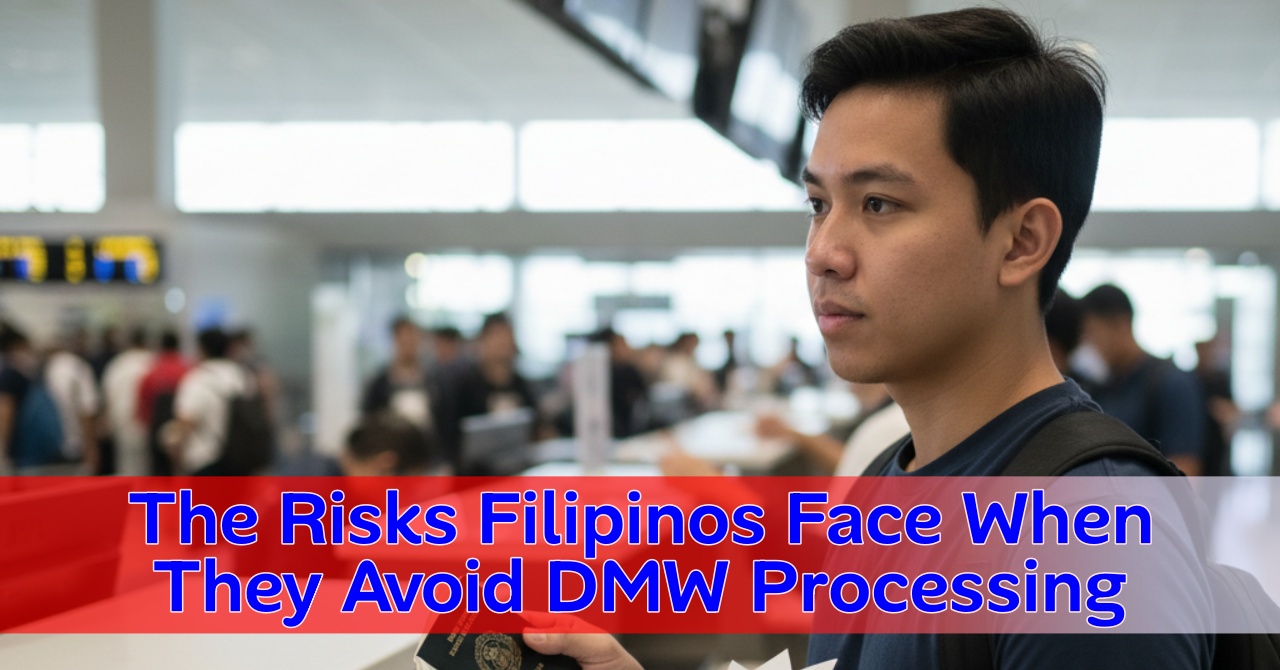Many Filipinos think that skipping the DMW process is faster and cheaper. Some even believe it is harmless, especially when someone they know offers a “direct job” in Taiwan. But once you step outside the legal route, the risks rise fast. You lose your rights, your protection, and your future opportunities. The shortcut may look easy, but its real cost appears later, often when help is no longer available.

Legal Route vs Shortcut Route: What’s the Difference
Here is a clear comparison of what you gain and lose depending on the path you choose:
Documentation
Legal route:
You get an OEC, a verified contract, POEA clearance, insurance, and PDOS training.
Shortcut:
You lack verified documents. No OEC. No PDOS. No insurance. You travel and work without any legal record.
Protection
Legal route:
DMW, MECO, and OWWA can help you if you face abuse, contract violations, or emergencies.
Shortcut:
You have no support. If something happens, you cannot ask DMW or OWWA for help because you were never documented in the first place.
Cost
Legal route:
Costs are transparent: passport, medical, training, placement fees, and processing.
Shortcut:
Many workers face hidden broker fees, under-the-table payments, or inflated charges for dorms and transportation.
Job Security
Legal route:
You have legal recourse for disputes, underpayment, or repatriation.
Shortcut:
You risk deportation, exploitation, or loss of income. No protection if your employer violates your contract.
Remittance and Benefits
Legal route:
You can access SSS, Pag-IBIG, PhilHealth, and legal remittance channels.
Shortcut:
You lose access to government benefits. Remittance may be done through unsafe channels.
Re-entry to Taiwan or Other Countries
Legal route:
Your record stays clean. You can apply again easily.
Shortcut:
You risk being blacklisted or banned after deportation.
What the DMW Actually Provides
The legal route is not just paperwork. Each requirement protects you in a specific way.
✅ Verified Contracts
Your contract must meet Taiwan’s labor standards and Philippine minimum protections. This prevents fake offers or abusive terms.
✅ OEC (Overseas Employment Certificate)
This is your legal proof that you are a documented OFW. Without it, the government cannot track or protect you.
✅ PDOS
PDOS teaches you your rights, Taiwan culture, emergency hotlines, and financial safety. Many OFWs say it helped them avoid common scams.
✅ Government Assistance
DMW, OWWA, and MECO can help you with legal disputes, unpaid salaries, medical issues, and repatriation. But only if you are a documented worker.
✅ Insurance and Benefits
Documented workers receive coverage for disability, death, and repatriation through OWWA and private insurance.
What Actually Happens When You Skip DMW
Many OFWs who tried the shortcut believed it would save time and money. What happened was the opposite.
You Become Invisible to the System
Without an OEC, you are not in the official OFW database. If you are abused, injured, or scammed, the government cannot step in because you do not exist in the records.
You Are Vulnerable to Illegal Recruiters
Most shortcuts are run by unlicensed agents or traffickers. They promise fast jobs but deliver unsafe conditions, fake contracts, or unpaid work.
You Can Be Deported Anytime
Taiwan’s labor inspections are strict. If you fail a document check, you can be detained and deported on the spot.
You Lose Access to Benefits
Without proper documentation, you cannot use government benefits like SSS, Pag-IBIG, PhilHealth, or OWWA support.
You Risk Being Blacklisted
A single immigration violation can block your chances of ever working in Taiwan again. Some even lose opportunities in other countries.
Real-Life Consequences Shared by OFWs
Filipinos who tried the shortcut route shared stories that repeat the same warning.
“Akala ko makakatipid ako, pero mas malaki pa ang gastos.”
Hidden broker fees, overcharged dorms, and no salary protection left many spending more than the legal route.
“Walang tumulong sa akin nung naaksidente ako.”
Workers with no DMW record struggled to get medical or legal support.
“Na-deport ako at hindi na ako makabalik.”
Once deported, many were banned from future applications, even when a legal employer later wanted to hire them.
Red Flags That a Job Offer Is a Shortcut
Walk away if you hear any of these:
- “No need for OEC or PDOS.”
- “We will process your visa in Hong Kong or Macau.”
- “Just pay now, we will handle everything.”
- “Huwag kang magsabi kahit kanino. Backdoor ito.”
These are signs of illegal recruitment and high-risk placement.
What Actually Helps If You Want to Work in Taiwan
Use DMW-Accredited Agencies
Check the DMW website for licensed recruiters. Do not trust verbal guarantees.
Ask for a Sample Payslip and Verified Contract
Make sure MECO or the Migrant Workers Office in Taiwan has verified the document.
Attend PDOS
The training gives you real-world information you will need abroad.
Keep Both Digital and Physical Copies of Documents
Your OEC, contract, medical results, and insurance must be available anytime.
Frequently Asked Questions
- Can I work in Taiwan without going through DMW
You can try, but you will be undocumented. If something goes wrong, you have no legal protection, no benefits, and higher risk of deportation.
- Why is the OEC important
The OEC is your proof that you are a legal OFW. Without it, the government cannot assist you in disputes or emergencies.
- Is the shortcut cheaper
Most undocumented OFWs end up paying more due to hidden fees, inflated dorm costs, or scam losses.
- What happens if I get caught without proper papers
You can be detained, deported, and banned from entering Taiwan again.
- Is PDOS required
Yes. It prepares you for real-life issues abroad and teaches you how to protect your rights.
Conclusion
The legal route may take longer, but it protects your rights, your money, and your future. The shortcut looks quick at first, but it often leads to exploitation, deportation, or permanent bans. If you want a safer and more stable life in Taiwan, start with the DMW. It is not just a requirement. It is your lifeline.
